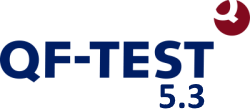Dear QF-Test users and interested parties,
Topics of this edition of our newsletter:
1. QF-Test Medium Upgrade 5.3 Released
2. Again we are a Great Place to Work
3. Free Special Webinar on September 27, 2021 about QF-Test and Continuous Integration
4. New Blog Articles and Videos
5. Next QF-Test Training Dates 2021
6. QF-Test Terms and Conditions Update
7. Release Notes for QF-Test 5.3
Your QFS Team
With the newly added browser connection mode CDP-Driver (Chrome DevTools Protocol) this medium upgrade is a real game-changer for web test automation with QF-Test.
By talking directly to the browser it supports Google Chrome, Microsoft Edge and Opera on Windows, Linux and macOS with a performance, stability and feature set formerly only available with QF-Driver for Chrome on Windows. And that's on top of a massive performance boost of QF-Driver for Chrome with observed speed-up ranging from 10% to over 500%.
The user interface of QF-Test has been cleaned up and streamlined, using a uniform flat look with fewer lines and beautiful new icons that still maintain the existing image language and are immediately recognizable. The HTML manual and tutorial as well as report and test documentation have also received a face-lift.
The update of the Jython integration to fully support international characters is complemented by several more new features and a handful of bug fixes.
Download link for QF-Test 5.3
For these and many other new features and bug fixes see the detailed list of differences between QF‑Test version 5.2.3 and 5.3 in the Release Notes in section 7 of this newsletter or online.
2. Again we are a Great Place to Work


We proudly announce that we are once again among the best employers in Germany - the title being awarded by Great Place to Work.
We would also like to mention that we now have 1,400 clients in 60 countries with 8,500 Licenses. This is another step for QF-Test and for better software quality worldwide.
We continue our popular special webinars. The webinar is free of charge but seats are limited. You will have the possibility to ask questions.
| Date | Content |
|---|---|
| Monday, September 27, 2021 (German version in the morning) | 14.30 - approx. 15.30 CEST: Everything in flux - Using QF Test with Continuous Integration Tools on the Example of Jenkins |
Reserve your seat via service@qfs.de or +49 8171 38648-10.
If you missed one of our special webinars or want to "catch up", you can find here the recordings of former special webinars.
4. New Blog Articles and Videos

Since the last newsletter we have published further blog posts and videos:
Blog
Videos
- QF-Test Version 5.3
- Recording of Special webinar on "Image Testing with QF-Test"
- Quick run through QF-Test | Test automation features
Visit our YouTube channel to subscribe and take a look at our blog.
5. Next QF-Test Training Dates 2021

We recommend participating in our QF-Test compact courses in small groups. Due to Covid-19 we only offer our trainings via webinar. As a major innovation, the standard training is also available in French for the first time.
| Date | Language |
|---|---|
| June 21-24, 2021 | German |
| September 20-23, 2021 | English |
| September 20-23, 2021 | French |
And of course you can always book training or consulting individually for you and your company normally at your site but at the moment primarily via webinar.
6. New Terms and Conditions

We would like to inform you about the update of our General Terms and Conditions for QF-Test and the related services. As a common process of maintenance, the agreements have been updated to the current state of the law. You can find the documents on the Terms and Conditions page.
7. Release Notes for QF-Test 5.3
New Features
The newly added browser connection mode CDP-Driver supplements QF-Driver and WebDriver for controlling Chromium based browsers via the Chrome DevTools Protocol. By talking directly to the browser without the intervening WebDriver protocol, speed, stability and feature set of CDP-Driver are on par with QF-Driver (and that's after the QF-Driver performance boost, see below). In addition, while QF-Driver is limited to Chrome on Windows, CDP-Driver now supports Google Chrome, Microsoft Edge and Opera on Windows, Linux and macOS, so this is a real game-changer for web test automation with QF-Test.
The performance of web tests with QF-Driver for Chrome has been significantly improved. Observed speed-up ranges from 10% to over 500%.
- The newly added browser connection mode CDP-Driver supplements QF-Driver and WebDriver for controlling Chromium based browsers via the Chrome DevTools Protocol. By talking directly to the browser without the intervening WebDriver protocol, speed, stability and feature set of CDP-Driver are on par with QF-Driver. In addition, while QF-Driver is limited to Chrome on Windows, CDP-Driver now supports Google Chrome, Microsoft Edge and Opera on Windows, Linux and macOS, so this is a real game-changer for web test automation with QF-Test.
- The user interface of QF-Test has been cleaned up and streamlined, using a uniform flat look with fewer lines and beautiful new icons that still maintain the existing image language and are immediately recognizable. The HTML manual and tutorial as well as report and test documentation have also received a face-lift.
- Use of international character sets in Jython scripts is now straightforward. If the new option "Literal Jython strings are unicode (16-bit as in Java)" is turned on, literal strings (explicitly specified string constants like "abc") in Jython scripts are treated as 16-bit unicode and are thus equivalent to strings in Java and the other QF-Test scripting languages. Please see subsection 12.3.4 for detailed information.
- Detection of errors in the browser console has been improved and, depending on the option "How to handle errors in a web application", they are logged in the QF-Test run-log. Besides, the new procedure
qfs.web.browser.settings.setTerminalLogsin the standard libraryqfs.qftcan be used to define if and how messages from the browser console are to be shown in the QF-Test terminal. - The embedded Chrome browser used for QF-Driver mode has been updated to CEF version 89.
- The bundled GeckoDriver was updated to version 0.29.1.
- Support for JxBrowser 7.14 and 7.15 was added.
- QF-Test now supports testing with Opera 76.
- The quickstart wizard now has its own toolbar button. This - or any other unwanted toolbar button - can now be removed from the toolbar via a right-click popup menu.
- The 'Wait for absence' node now has a dedicated entry in the »Insert« menu and its logic when applied to sub-items has been simplified: Execution of the node is successful if either the parent component of the sub-item is absent or the sub-item itself.
- When running a test with the command line argument
-verbose [], QF-Test now expands variables in node names for console output also. - The default setting for the available Java memory for QF-Test has been increased to 1024 MB. The configuration of existing QF-Test installations is not affected.
- Sub-items of Swing
JComboBoxcomponents can now be addressed relative to theJComboBoxwithout requiring identification of the popup list. - The ability to bring windows of the SUT to the foreground when needed and set the input focus is crucial for automated testing. On Linux QF-Test now uses an updated, more reliable method to bring a window on top regardless of desktop settings if the option "Force window to the top" when raising is not deactivated.
- Exception messages in the run-log or an error dialog are now displayed using word-wrap to break long lines. This can be turned off via the option "Wrap lines in exception messages".
Bugs Fixed
- Installing a resolver via the generic method
resolvers.addResolver()did not work in SUT scripts with the JavaScript language. - The browser zoom level is now reset to 100% when clearing the browser cache.
- The procedure
qfs.swing.startup.startWebstartSUTnow ensures proper quoting of the jnlp argument for use on the command line of Linux systems in order to avoid side-effects from special characters it might contain. - The qfs:label extra feature for elements within a TabPanel of a native WPF application was not determined correctly.
- Since QF-Test version 5.2.2 in very special cases elements in a web page were mistakenly considered to be invisible.
- QF-Test now runs again on macOS versions older than 10.14.
- Fast replay of several mouse clicks onto the same location of a Webswing application could accidentally create double clicks when redirecting events through the browser.
Changes that can affect test execution
- Jython issues with character encoding have been reduced and it is now possible to treat Jython literals as 16-bit unicode string which is the natural representation for Java and thus QF-Test. For compatibility reasons the new option "Literal Jython strings are unicode (16-bit as in Java)" is turned off by default if QF-Test encounters an existing system configuration.
- Please see subsection 12.3.4 for detailed information about why the option should be turned on and how to trouble-shoot possible issues. Chances are high that your Jython scripts will simply work and string handling will become much cleaner. If not, either undo the option change or fix the resulting incompatibilities. We had to do the latter in only a handful of places in our over 1600 test-suites, some of which date back over 20 years. The section Trouble shooting Jython encoding issues explains the most common pitfalls and of course our support is always there to help.
- The default folder name of the Firefox profile when executed in WebDriver connection-mode has been renamed from
mozProfiletofirefoxProfileand it is now used in place instead of copying it to a temporary directory. This behaviour is now consistent with using QF-Driver but has the side-effect that preferences from one test execution are preserved for the next execution and might have to be overwritten during the next browser start. To restore the previous behavior, set theOPT_WEBDRIVER_COPY_MOZPROFILEoption to true before starting the browser. - The procedures in the package
qfs.utils.sshof the standard libraryqfs.qftand the underlying Jython module ssh have been updated to default to RSA public key authentication with the default private key file/.ssh/id_rsainstead of DSA which is no longer supported by most current ssh servers. The option "Create compact run-log" is now deactivated by default in interactive mode. Existing system configurations are not affected and the option has no effect in batch mode where compactification is controlled via the command line attribute -compact.


![[Translate to French:] QFS Team picture](/fileadmin/_processed_/c/0/csm_2021-great-place-to-work-gruppenfoto_d6da47e2fa.jpg)